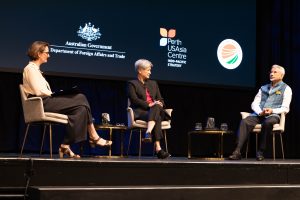On Friday and Saturday last week the seventh Indian Ocean Conference was held in Perth, Western Australia. The conference was an opportunity for Indian Ocean rim countries – and those that rely on the region – to discuss the pressing issues within the Indian Ocean, and float ideas to address emerging problems. The theme of the conference was “Towards a Stable and Sustainable Indian Ocean” and the keynote addresses were delivered by Australia’s Foreign Minister Penny Wong and India’s Minister for External Affairs, S. Jaishankar.
While stability and sustainability could be interpreted in a multitude of ways, the more direct, yet undeclared, theme of the conference was China. Although the official government representatives speaking at the conference were reluctant to mention China by name, all who advocated for an agreed-upon set of rules and norms in the Indian Ocean region were discussing Beijing in practice. There are, of course, other threats to regular trade and safe passage in the region – like Houthi attacks on ships in the Red Sea – but these don’t pose the structural challenges that China does.
The primary concern is that Beijing’s willful violations of the United Nations Convention on the Law of the Sea (UNCLOS) in the South China Sea may lead to China ignoring UNCLOS in the Indian Ocean as well. As Wong stated in her address: “The countries gathered here are no strangers to strategic competition – and you are also no strangers to its costs. As expanding military powers take a greater interest in our region, we each need to sharpen our focus on what our interests are, and how to work together to uphold them.”
In his keynote address, Jaishankar also made note of the threats to stability, both from non-state actors and from China’s attempts to revise to agreed-upon rules and norms. “As we gaze at the Indian Ocean, the challenges besetting the world are on full display there,” the Indian external affairs minister said. “At one extremity, we see conflict, threats to maritime traffic, piracy and terrorism. At the other, there are challenges to international law, concerns about freedom of navigation and overflights, and of safeguarding of sovereignty and of independence. Any disregard for arduously negotiated regimes like UNCLOS 1982 is naturally disturbing.”
Freedom of navigation is something most of us take for granted. The interconnected nature of the global economy means that most of the products that we rely upon for our daily lives have come to us via ship. We expect these products to be in our stores without thinking about how they actually got there, and the efforts it has taken – both diplomatically and in terms of security – to guarantee that these products will be available.
It was Singapore’s foreign minister, Vivian Balakrishnan, who made this point:
The moment a ship leaves Perth, or Colombo, or Mumbai, or Singapore, that ship does not have to seek permission from anyone or pay rental to anyone to decide where it is going to call, wherever it is in the world. That is the legal and economic significance of freedom of navigation. Even if you have to traverse territorial seas, or straits used for international navigation, you assert the right of innocent passage, you get to go through, you pay no one, you seek no permissions. Now, this is critical, even today, for economic lifeblood.
This freedom of navigation exists because states have agreed that it is in everyone’s interest. It was notable that smaller states at the conference – including landlocked ones like Nepal and Bhutan, which also rely on the Indian Ocean – were keen to emphasize their own concerns about challenges to UNCLOS. It is smaller states that benefit the most from mutually beneficial rules and norms, as they often lack the muscle to protect their own interests.
This was a point acknowledged by Wong, who stressed the desire for a “region that is peaceful and predictable…Where a larger country does not determine the fate of a smaller country.” Such a region relies on a “credible military capability” that can make the risks of challenging these norms far too great.
Which leads to the other elephant in the conference room – the United States. We have all been fortunate to live during a period where the world’s most powerful state has acted as a guarantor of freedom of navigation. This has enabled a period of extraordinary prosperity for many, and a reduction in extreme poverty for others. Yet a burgeoning disinterest in being such a guarantor – especially within the Republican Party – is the other major threat to stability in the Indo-Pacific.
This trend makes the concerns about China expressed at the Indian Ocean Conference all the more nerve-wracking.

































